|
With the dearth of new musicals opening on or off Broadway, it is no
wonder that many record companies are releasing albums from shows of
yesteryear that were not, how shall we put it, feathers in anyone's cap
or successful ventures. In more vulgar parlance: flops. Now I am,
admittedly, a major acolyte in the 'cult of the less-than-successful
musical' and have even gone on record as offering a quarter of my soul to
have had the chance to see Carrie. However, even I have come to the
realization that a large number of these forgotten musicals have been lost
in the sands of time for good reason, which is why anytime a worthwhile
discovery is made in the dark realms of failed musicals, it is a reason to
celebrate.
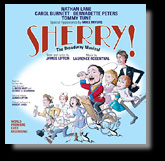 Well, folks, it's time to pop the champagne and put on the party hats
because a treasure trove has been unearthed: Sherry!, a musical
adaptation of Kaufman and Hart's classic comedy, The Man Who Came to
Dinner. The score, which features music by Laurence Rosenthal and book
and lyrics by James Lipton (yes, the host from Bravo's Inside the
Actor's Studio), was presumed lost after the show's closing in 1967
until it magically resurfaced in 2000. After tweaking the score to
reflect the show that Rosenthal and Lipton had originally intended, an
all-star cast was assembled to sing over orchestra tracks containing an
unprecedented number of musicians (67 in the overture alone), and as a
result, the show sounds better than it ever had (and probably ever will
again). Well, folks, it's time to pop the champagne and put on the party hats
because a treasure trove has been unearthed: Sherry!, a musical
adaptation of Kaufman and Hart's classic comedy, The Man Who Came to
Dinner. The score, which features music by Laurence Rosenthal and book
and lyrics by James Lipton (yes, the host from Bravo's Inside the
Actor's Studio), was presumed lost after the show's closing in 1967
until it magically resurfaced in 2000. After tweaking the score to
reflect the show that Rosenthal and Lipton had originally intended, an
all-star cast was assembled to sing over orchestra tracks containing an
unprecedented number of musicians (67 in the overture alone), and as a
result, the show sounds better than it ever had (and probably ever will
again).
For those unfamiliar with the show or its source material,
Sherry! tells the tale of Sheridan Whiteside (played by Nathan
Lane, who recently portrayed the part in a Broadway revival of the source
material), an all around renaissance man/critic/writer of the arts
(loosely based on Alexander Woollcott, a man Noel Coward called "a caged
cobra") who terrorizes the folks of Mesalia, Ohio, after an immobilizing
accident occurs during his lecture there. This irritating invalid proceeds
to turn the holidays into the Twelve Days of Hell through a cast of
thousands that includes cockroaches, convicts, penguins, an octopus, an
Egyptian mummy, and a flood of oddball societal well-wishers.
The show only ran for 65 performances on Broadway and, aside from the
title track appearing on Unsung Musicals, none of its songs were
ever recorded. The score is remarkably strong, however, and even surpasses
that belonging to a recent pastiche-laden Tony winning show that recently
lost its leading lady. From Whiteside's opening number, "Why Does the
Whole Damn World Adore Me," (a number that perfectly sets up the character
and is delightfully realized by Nathan Lane) to "In The Very Next Moment"
(a number sung by Whiteside's admirers that recalls Annie's "I
Think I'm Gonna Like it Here" by way of Me and My Girl), to the
tender "Maybe It's Time for Me" (sung by Bernadette Peters as Whiteside's
long suffering assistant, Maggie) the score contains a surprising number
of gems. Even lesser numbers, like the title song (a gossip list number
sung by Lane and Carol Burnett that tries to be a cynical look at society
a la Noel Coward's "I Went to a Marvelous Party" or Cole Porter's "Thank
You So Much, Mrs. Lowsborough - Goodby" but wears thin with repeated
listenings) or "I Always Stay at the Ritz" (sung by Tommy Tune as the Noel
Coward-inspired Beverly) are highly entertaining and make for a delightful
listen.
Whether or not the show would ever work on stage remains to be seen, as
one suspects that it is one of those shows whose score is stronger than the
book, making it an obvious contender for an Encores! type concert
setting. However there's no denying that the score, especially as
performed with this cast and orchestra, makes for a thoroughly
entertaining and refreshing listen. And if that weren't enough, the
two-disc album includes bonus film footage of interviews Lipton conducted
with the stars in which he discusses the show, as well as footage
chronicling the making of the recording.
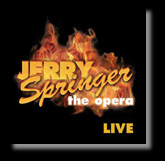 At first glance, one cannot imagine a less likely subject for a
musical than the trash-talking/confessional talk show, The Jerry
Springer Show
. Yet that is precisely what has happened with Jerry
Springer: The Opera, a live recording of which is now available on CD. At first glance, one cannot imagine a less likely subject for a
musical than the trash-talking/confessional talk show, The Jerry
Springer Show
. Yet that is precisely what has happened with Jerry
Springer: The Opera, a live recording of which is now available on CD.
This is certainly not an album for the prudish, as the show, with music
by Richard Thomas and book/lyrics by Thomas and Stewart Lee, brings to
life the foul mouthed debates/all-out-wars that rage on the show over
topics like "my mother was my dad," "chicks with a dick," "men who like
sex while in diapers," and the Ku Klux Klan. The shock/enjoyment of the
album is to hear these topics set to music reminiscent of Mozart, Bach and
Handel, with just enough pop-rock to shake things up.
The show is performed in three acts, each of which contains a brilliant
concept (the first act is a musicalization of a typical Jerry Springer
show, the second act has him in Purgatory after being shot on the show,
and the third has him in hell confronting God and Satan, with special
guests Jesus, Mary, Eve and Adam). But as each act wears on, the novelty
of setting the lowest-of-the-lowbrow entertainment to the rarified genre
of opera wears off and the songs begin to feel repetitious. While the
cast is uniformly wonderful (Michael Brandon eerily re-creates Jerry
Springer's voice and mannerisms and Alison Jiear is transcendent as an
overweight housewife who dreams of being a pole dancing stripper), this is
most decidedly one of those shows that should experienced live before
listening to the cast album as much of the humor would be ruined
otherwise. Since a production is tentatively scheduled to arrive in New
York in the spring of 2005, it might behoove one to wait for one's Jerry
Springer moment.
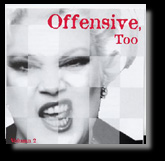 Speaking of offensive songs, Sharon McNight has recently released
Offensive, Too, her second album devoted to songs she performed in
her show, Songs to Offend Everyone. As with her previous album,
this is a delightful CD that displays great wit as it nails various sacred
cows to the wall. This time around, she declares "Let's Talk Dirty to the
Animals" (a number by Michael O'Donoghue that appeared on Gilda Radner's
classic comedy album), takes a swipe at "Republicans" (an election year
favorite by William Finn), examines why one cannot eat "Dog in Taiwan" (a
hysterical number by Modern Man), extols the virtues of "Poisoning Pigeons
in the Park" (what offensive comedy CD would be complete without a song by
Tom Lehrer) and implores "Blow Me" (a delightful number that sounds
dirtier than it is ... but not by much). While McNight is one of our comic
goddesses, she ends the album with a hard hitting number considered to be
one of the most offensive songs of the 20th Century (or at least on the
most offensive topic), "Strange Fruit." Speaking of offensive songs, Sharon McNight has recently released
Offensive, Too, her second album devoted to songs she performed in
her show, Songs to Offend Everyone. As with her previous album,
this is a delightful CD that displays great wit as it nails various sacred
cows to the wall. This time around, she declares "Let's Talk Dirty to the
Animals" (a number by Michael O'Donoghue that appeared on Gilda Radner's
classic comedy album), takes a swipe at "Republicans" (an election year
favorite by William Finn), examines why one cannot eat "Dog in Taiwan" (a
hysterical number by Modern Man), extols the virtues of "Poisoning Pigeons
in the Park" (what offensive comedy CD would be complete without a song by
Tom Lehrer) and implores "Blow Me" (a delightful number that sounds
dirtier than it is ... but not by much). While McNight is one of our comic
goddesses, she ends the album with a hard hitting number considered to be
one of the most offensive songs of the 20th Century (or at least on the
most offensive topic), "Strange Fruit."
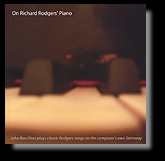 A few years ago, we celebrated what would have been the centennial of
Richard Rodgers' birthday. As a result, a veritable typhoon of recordings
flooded the market devoted to his works to the point of over saturation.
Thankfully, enough time has elapsed for this listener, at least, to
wade back into the songs crafted by one of musical theater's greatest
composers, since a remarkable album has arrived from the most unlikeliest
of sources: John Bucchino, a composer whose works are usually in a
syncopated vein not in keeping with Rodgers' more romantic style.
Bucchino, however, is full of surprises in On Richard Rodgers'
Piano
, an instrumental album that features Bucchino performing
melodies written by Richard Rodgers on a Steinway he purchased in 1939,
and on which he wrote many of his greatest creations. As filtered through
Bucchino, the tunes have a free-flowing improvised feel (no small wonder,
as Bucchino admits that none of the arrangements were written down, and
only one of them, "My Favorite Things," was even pre-meditated before the
recording). By turns jazzy (the slightly discordant "The Lady is a Tramp"
and the highly infectious "My Favorite Things"), delicate (the ethereal
"Edelweiss," which evokes the image of a tender lullaby and a surprisingly
touching "Something Good," one of the few songs for which Rodgers
contributed both music and lyrics), and wistful (a lilting "It Might as
Well Be Spring"), On Richard Rodgers' Piano displays not only a
side to Bucchino not previously displayed, but an appreciation for the
genius Rodgers showed for melodies. A few years ago, we celebrated what would have been the centennial of
Richard Rodgers' birthday. As a result, a veritable typhoon of recordings
flooded the market devoted to his works to the point of over saturation.
Thankfully, enough time has elapsed for this listener, at least, to
wade back into the songs crafted by one of musical theater's greatest
composers, since a remarkable album has arrived from the most unlikeliest
of sources: John Bucchino, a composer whose works are usually in a
syncopated vein not in keeping with Rodgers' more romantic style.
Bucchino, however, is full of surprises in On Richard Rodgers'
Piano
, an instrumental album that features Bucchino performing
melodies written by Richard Rodgers on a Steinway he purchased in 1939,
and on which he wrote many of his greatest creations. As filtered through
Bucchino, the tunes have a free-flowing improvised feel (no small wonder,
as Bucchino admits that none of the arrangements were written down, and
only one of them, "My Favorite Things," was even pre-meditated before the
recording). By turns jazzy (the slightly discordant "The Lady is a Tramp"
and the highly infectious "My Favorite Things"), delicate (the ethereal
"Edelweiss," which evokes the image of a tender lullaby and a surprisingly
touching "Something Good," one of the few songs for which Rodgers
contributed both music and lyrics), and wistful (a lilting "It Might as
Well Be Spring"), On Richard Rodgers' Piano displays not only a
side to Bucchino not previously displayed, but an appreciation for the
genius Rodgers showed for melodies.
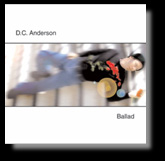 I have said it before and I'll say it again: D.C. Anderson is one of
cabaret's most eclectic of performers. Currently touring in The Phantom
of Opera as Andre, he displays the prerequisite brassy Broadway voice
when the need requires, but also possesses a subtle and supple voice that
caresses the listener with its warmth and simplicity. While he is best
known for his sly and wry way with a comic number, his latest CD,
Ballad, displays a side of Anderson that has been on
ever-increasing display. As the title implies, Ballad largely
consists of songs that deal with love, be
it found, lost, or sought after. The revelation of the album is that all
the songs contain lyrics written by Anderson. I have said it before and I'll say it again: D.C. Anderson is one of
cabaret's most eclectic of performers. Currently touring in The Phantom
of Opera as Andre, he displays the prerequisite brassy Broadway voice
when the need requires, but also possesses a subtle and supple voice that
caresses the listener with its warmth and simplicity. While he is best
known for his sly and wry way with a comic number, his latest CD,
Ballad, displays a side of Anderson that has been on
ever-increasing display. As the title implies, Ballad largely
consists of songs that deal with love, be
it found, lost, or sought after. The revelation of the album is that all
the songs contain lyrics written by Anderson.
Even though this is a
more serious album than his previous CDs, his sense of humor continues to
percolate throughout, with a few of the cuts being full-fledged comic
numbers ("Chocolate is Fine," which divulges clinical reasons why we love
the stuff, and "Human Fondue," which gives a warning about using said
substance in an erotic manner). Other highlights include "If You Touch
Me" (music by Roy Zimmerman), a love song that is refreshing and effective
in its simplicity, and the bittersweet "Leave You Now" (music by Carol
Hall). For more information visit http://www.dcanderson.net.
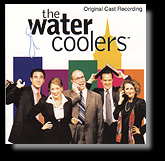 If Forbidden Broadway or The Capitol Steps were to tackle
the comic strip Dilbert, the result would probably be a lot like
The Water Coolers, a musical revue that examines the joys of office
life. Told primarily through pop songs with parody lyrics, The Water
Coolers chronicles a week-in-the-life of a group of office workers.
Starting with "Panic Monday" (set to The Bangles' "Manic Monday"), in
which an office worker wonders what occurred during the drunken office
party the previous Friday, the show deals with the week-long
preparation of an office presentation and the conflicts and personality
quirks it inspires. Anybody who has ever held an office job will readily
identify with the humor and the parodies are well written and
entertaining. If Forbidden Broadway or The Capitol Steps were to tackle
the comic strip Dilbert, the result would probably be a lot like
The Water Coolers, a musical revue that examines the joys of office
life. Told primarily through pop songs with parody lyrics, The Water
Coolers chronicles a week-in-the-life of a group of office workers.
Starting with "Panic Monday" (set to The Bangles' "Manic Monday"), in
which an office worker wonders what occurred during the drunken office
party the previous Friday, the show deals with the week-long
preparation of an office presentation and the conflicts and personality
quirks it inspires. Anybody who has ever held an office job will readily
identify with the humor and the parodies are well written and
entertaining.
Highlights include "Who Will Buy (This Crap For My Kid's
School)" (which perfectly turns Oliver's "Who Will Buy" into a
pageant of parental hawking), "The I.T. Cowboy" (which will resonate with
anybody who ever had to deal with that most essential subgroup of
co-workers), and "Unless It's From Me" (about the bane of all
presentations' existence: the participant that refuses to accept any idea
that does not come from him or her).
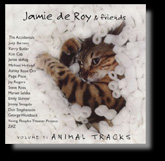 For her fifth anthology album, producer/performer Jamie deRoy has released
a collection entitled Animal Tracks, which, as the title suggests,
consists of songs devoted to members of the animal kingdom. Featuring a variety of performers culled from cabaret and Broadway, this is a delightful mix of the serious and the humorous. Emily Skinner
sparkles on Harry Nilsson's infectious "The Puppy Song." Steve Ross
explores the sex life of our aquatic cousins in "Dolphins' Song" with
highly comic results. Jay Rogers is simply hysterical on an obscure Kander
and Ebb number, "The Elephant Song," which asks the musical query 'where
does an elephant go?' (to die, that is). Other participants include Marian
Seldes ("The Cat Who Wasn't There"), Kerry Butler ("Lion Tamer"), Judy
Barnett and Michael Holland ("Blackbird") and Jimmy Smagula ("Bless the
Beasts and the Children") For her fifth anthology album, producer/performer Jamie deRoy has released
a collection entitled Animal Tracks, which, as the title suggests,
consists of songs devoted to members of the animal kingdom. Featuring a variety of performers culled from cabaret and Broadway, this is a delightful mix of the serious and the humorous. Emily Skinner
sparkles on Harry Nilsson's infectious "The Puppy Song." Steve Ross
explores the sex life of our aquatic cousins in "Dolphins' Song" with
highly comic results. Jay Rogers is simply hysterical on an obscure Kander
and Ebb number, "The Elephant Song," which asks the musical query 'where
does an elephant go?' (to die, that is). Other participants include Marian
Seldes ("The Cat Who Wasn't There"), Kerry Butler ("Lion Tamer"), Judy
Barnett and Michael Holland ("Blackbird") and Jimmy Smagula ("Bless the
Beasts and the Children")
-- Jonathan Frank
Make sure you check our list of Upcoming Releases.
|
|

